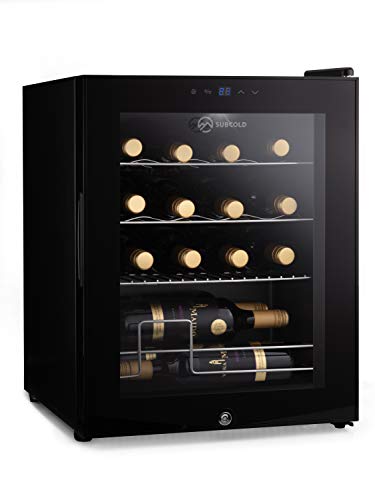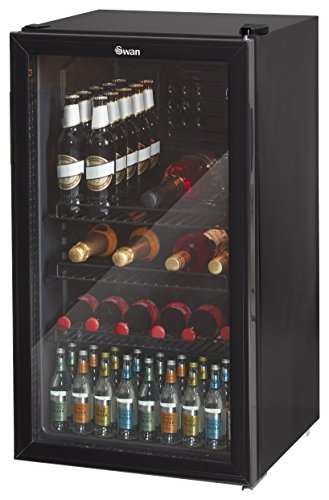10 Amazing Graphics About Beer And Wine Refrigerator
페이지 정보
작성자 Inge Cansler 댓글 0건 조회 155회 작성일 24-09-20 03:02본문
 Choosing a Beverage and Wine Refrigerator
Choosing a Beverage and Wine RefrigeratorWhether you're hosting guests or sipping a glass of wine with an evening meal, this dual-zone fridge is the ideal solution to store and chill both wines and beers. It can be freestanding or built-in, and comes with a seamless, seamless door that is able to fit into any space.
While vibrations are generally harmless but they can disrupt the sediment in a bottle and trigger chemical reactions that may not be obvious. Over time, this can reduce esters and dull flavors.
Humidity Control
Humidity refers to the amount of water vapor that is present in the air, and it varies throughout the day due to a number of factors. Temperature, precipitation and wind can all have an enormous influence on the level of humidity. Achieving the right level of humidity is essential for a variety of reasons. Humidity is a factor in the weather patterns and indoor air quality, and even the storage of wine. The delicate wine's composition contains numerous aromatic compounds that are sensitive to changes in humidity. The wine's flavor can be affected by excessive humidity. It can alter the balance of these aromatic compounds. A wine refrigerator can help keep the proper humidity level to preserve the taste of a bottle.
A wine fridge can also stop the deterioration of corks and provide a proper seal. If humidity is too low, corks will dry out and allow oxygen into the bottle, which can accelerate the aging process and tainting the wine's taste. A wine refrigerator can help to maintain a humidity level of 55%-75% to prevent this from occurring.
Wine coolers are also a great way to store beer and wine. A wine cellar is primarily designed to be used for long-term storage. Many of these units have a dedicated space for beer bottles, which means you can easily keep your beer and craft beers in the same location as your most cherished wines. These units are designed to balance temperatures and humidity to prevent condensation, which could damage labels and packaging.
Most models come with the hygrometer, which lets you monitor the humidity level of your wine cooler and adjust it to suit your needs. You can also use an air humidifier inside your wine refrigerator to increase humidity.
If you decide to use a wine refrigerator, place the dehumidifier inside a room separate from it. This will prevent the dehumidifier from absorbing any wine or beer you store in the refrigerator. If you intend to store your wine for a long time, humidity control is essential. In a short period of time, you might not notice any changes in your wine, but over time the absence of humidity can significantly alter the flavor profile of your preferred wines.
Vibration Absorption
The vibrations inside the wine refrigerator can alter the natural aging process for the wines stored inside. Even the smallest vibrations can cause agitation in the sediment in the bottle and trigger complex chemical reactions that reduce esters and dull the wine's flavor over time. To safeguard your valuable wine collection all La Sommeliere units are equipped with a special vibration absorption system that significantly reduces the impact of tremors as well as noise, and helps ensure that your wine ages properly and quietly.
In addition to the fact that wine coolers usually emit less sound than conventional refrigerators, they are susceptible to noise problems due to the system of fans and refrigerant circuits used in the majority of units. It is essential to adhere to the guidelines for clearance and put your wine cooler in a quiet space away from any other sources of noise.
It is also recommended that you clean your cheap inexpensive wine fridge fridge (visit the following website page) cooler on a regular basis with a nonabrasive cleaner and let it "air out" for several minutes prior to filling it with bottles. This will lessen the amount of dust or dirt that could build up in the air vents.
In the end, if you notice that your wine fridge for kitchen fridge is producing excessive noise, it may be because of a malfunctioning electric fan or compressor. The compressor is usually located in the rear of the wine refrigerator. If it is placed in an unbalanced position or bumps into something behind it the rubber mounts may be shaken loose, which can cause loud humming noises.
The compressor wine cooler functions as a normal fridge, compressing air molecules electronically, which decreases their temperature. They then blow through the interior of your fridge. This type of cooling is much more energy efficient than other cooling methods, such as evaporator or frost-free refrigerators. The drawback to compressor wine coolers is that they require frequent repairs and produce more noise than other types of refrigerators. Many consumers choose thermoelectric wine chillers that don't require a compressor.
Temperature Control
Like wine, beer has specific temperatures that allow it to maintain optimal flavor. It is important to select a beverage and wine refrigerator with adjustable temperature controls. This allows you to keep your beverages at the perfect temperature for storage and serving for each type. You can also find dual zone models that have an additional temperature zone for top rated wine fridge bottles and separate temperature zones for beer or other beverages.
Generally speaking, most beer styles prefer to be served cooler than wine. However, the ideal serving temperature for a particular style depends on its nature and the method of making it. Wheat beers and Pilsners should be served between 40 and 50 degrees Fahrenheit. the IPAs, barleywines, and stronger ales are best served at 50 to 55 degrees Fahrenheit. The beer that is left to warm too much will give it an unpleasant "skunk" smell that can detract from the overall experience.
You'll want a wine refrigerator that can provide the right temperature range for your preferred reds and whites. Certain wine coolers and refrigerators refrigerators come with humidity-control features to stop oxidation and keep the corks in good order. Some even feature specialized UV glass to block out sunlight, which helps maintain the wine's hue and protect it from premature aging.
The temperature control system in refrigerators can be powered either by compressor or thermoelectric cooling. Compressors use vapor compressors to reduce temperatures in the wine refrigerator, and thermoelectric models utilize electronic convection fan technology to circulate cool air around the refrigerator. The majority of refrigerators utilize both of these techniques for the most efficient results.
If you are planning to purchase a beverage or wine fridge that uses the compressor technology, you should look for one with shockpads that are vibration-resistant. This is because the rumble generated by compressors can interfere with the normal process of maturing wine and speed up the process of oxidation.
While you can buy a fridge that's designed specifically for wine, you may prefer to shop for a standard refrigerator or even a regular refrigerator that has a spacious interior with adjustable shelves and plenty of storage in the door. You can alter the space to fit a variety of bottles and cans, which include wine, beer and other beverages.
Storage Options
If you love to host parties and have a wide range of drinks on the menu, consider a beverage cooler. These refrigerators can store bottles and cans of wine and beer with other beverages that are ice cold like water and soda. They are available in both built-in and freestanding models. Built-in models can be placed under counters or inside cabinets in kitchens that have little space.
Both kinds of fridges are available in a wide range of sizes and styles which makes them suitable for most homes. Look for models that have sliding shelves that make it easier to find your favorite wines and brews. Some refrigerators feature soft LED lighting to showcase your collection with a soft, gentle glow. Some models even come with an option to control humidity. This function can help in preventing the formation of frost in your refrigerated wine and beer bottles, so that you can enjoy your favorites without worrying about the accumulation of frost.
A refrigerator that features dual zones will allow you to store your favorite wines at the ideal serving temperatures. You can also store craft beers in separate zones because it is able to maintain similar temperatures to bottles of wine. A dual zone wine and beer refrigerator can also hold larger bottles of beer or spirits than a typical fridge for home use.
The proper storage conditions can prolong the shelf life of your beer and wine, so be sure to keep them in a well-ventilated area that is protected from light. The refrigerator should also be kept free of odors, dust and other debris that can alter the taste of your drinks as time passes.
 If you're storing a large collection of wines and you want to preserve their quality, consider a cellar refrigerator. This kind of refrigerator is intended for long-term storage and operates at a slightly warmer temperature than a wine refrigerator permitting your bottles to maintain their optimal flavor. A cellar refrigerator is also equipped with an humidifier to ensure the appropriate humidity. This ensures that the cork stays damp and impermeable, keeping outside air and the traces of food stored in refrigerators from getting into your wine bottle and deteriorating its quality over time.
If you're storing a large collection of wines and you want to preserve their quality, consider a cellar refrigerator. This kind of refrigerator is intended for long-term storage and operates at a slightly warmer temperature than a wine refrigerator permitting your bottles to maintain their optimal flavor. A cellar refrigerator is also equipped with an humidifier to ensure the appropriate humidity. This ensures that the cork stays damp and impermeable, keeping outside air and the traces of food stored in refrigerators from getting into your wine bottle and deteriorating its quality over time.댓글목록
등록된 댓글이 없습니다.